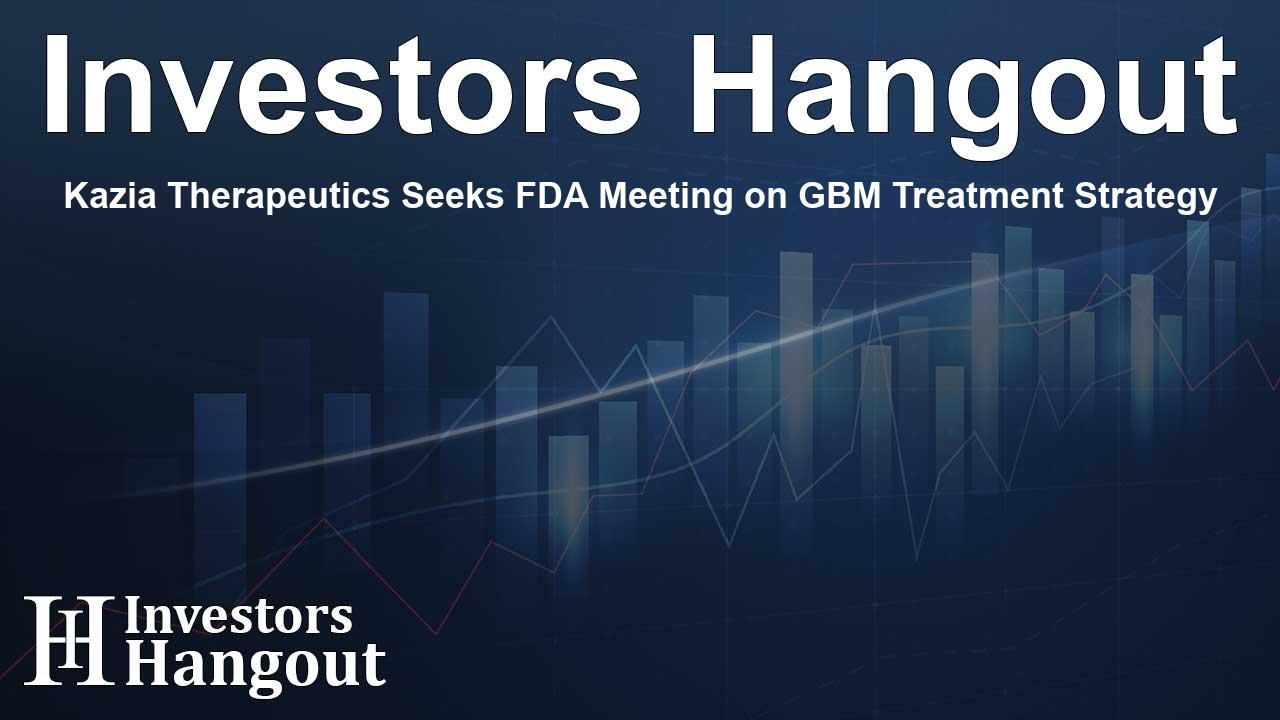Kazia Therapeutics Seeks FDA Meeting on GBM Treatment Strategy

Kazia Therapeutics Plans FDA Meeting to Discuss GBM Treatment
Kazia Therapeutics Limited (NASDAQ: KZIA) has announced a significant step forward in its efforts to improve treatment options for glioblastoma, a highly aggressive form of brain cancer. The company's leadership intends to request a Type C meeting with the U.S. Food and Drug Administration (FDA) to review overall survival data from a study involving paxalisib, an investigational therapy. This meeting is part of Kazia's proactive approach in alignment with the FDA's Project FrontRunner initiative.
A Focus on Overall Survival in Glioblastoma
The urgency surrounding glioblastoma treatment is underscored by its reputation as one of the most challenging cancers with minimal therapeutic options. Dr. John Friend, M.D., CEO of Kazia Therapeutics, emphasized the importance of engaging with the FDA. He stated, "Our goal is to discuss whether the overall survival data we have gathered may support a conditional approval pathway for paxalisib.”
Kazia is committed to presenting compelling survival analyses and the design of a future confirmatory study. Dr. Friend noted that overall survival is a critical endpoint that must be prioritized in the development of treatments for malignant cancers like glioblastoma.
Understanding Project FrontRunner
Project FrontRunner is an initiative by the FDA's Oncology Center of Excellence, crafted to encourage the approval of cancer treatments in earlier stages of the disease. This approach contrasts with traditional methodologies that often delay treatment options until patients have exhausted other therapies. Kazia is poised to leverage this initiative in their discussions with the FDA.
The recent guidance from the FDA highlights that overall survival milestones should be a key focus in oncology trials, especially in contexts where the disease is rapidly progressive. Kazia's strategy encapsulates this focus, aiming to address the urgent needs of GBM patients.
Kazia's Ongoing Research and Development
The company recently revealed positive outcomes from a secondary analysis of new, unmethylated GBM patients undergoing treatment with paxalisib. The median overall survival for those receiving paxalisib was reported at 15.54 months, significantly exceeding the 11.89 months achieved with conventional standard of care. This data strengthens Kazia's argument for the efficacy and safety of paxalisib as they prepare for the Type C meeting.
Dr. Friend elaborated on Kazia's commitment to a patient-centered approach, asserting that the company will collaborate closely with the FDA to ensure that their regulatory strategies are adaptable and in tune with evolving standards. The overarching goal remains a conditional approval based on compelling clinical endpoints.
Recognizing Industry Trends
Kazia recognizes that a growing number of oncology companies are increasingly acknowledging the significance of Project FrontRunner in their developmental pathways. This change indicates a shifting landscape in how cancer therapies are being developed and approved, hinting at a potential transformation in treatment paradigms that traditionally focused only on more advanced disease stages.
Future Steps for Kazia Therapeutics
With plans to initiate a randomized Phase 3 confirmatory study designed for broader regulatory acceptance, Kazia is ensuring that clinical evidence supports their NDA filing. This proactive planning places the company in a strong position within the oncology sector, especially in light of the critical nature of glioblastoma.
On the research front, Kazia Therapeutics continues exploring paxalisib's potential across various indications, inclusive of advanced breast cancer and other neurological malignancies. The company remains dedicated to advancing cancer treatments, driven by a commitment to enhance patient outcomes.
Frequently Asked Questions
What is Kazia Therapeutics proposing to the FDA?
Kazia Therapeutics plans to request a Type C meeting to discuss overall survival data for paxalisib in glioblastoma patients and potential regulatory pathways.
What is the significance of the FDA's Project FrontRunner?
Project FrontRunner encourages the approval of cancer therapies at earlier stages, rather than waiting for patients to exhaust all other options, improving treatment accessibility.
What were the findings in the recent GBM study conducted by Kazia?
The study showed a median overall survival of 15.54 months for patients treated with paxalisib, compared to 11.89 months for conventional treatments.
How is Kazia Therapeutics ensuring its alignment with regulatory expectations?
The company is preparing a comprehensive briefing package for the FDA that outlines survival analyses and the design for a confirmatory Phase 3 study, aligned with new guidelines.
What other research is Kazia involved in besides glioblastoma?
Kazia is also exploring paxalisib's applications in advanced breast cancer, brain metastases, diffuse midline gliomas, and primary central nervous system lymphoma.
About The Author
Contact Ryan Hughes privately here. Or send an email with ATTN: Ryan Hughes as the subject to contact@investorshangout.com.
About Investors Hangout
Investors Hangout is a leading online stock forum for financial discussion and learning, offering a wide range of free tools and resources. It draws in traders of all levels, who exchange market knowledge, investigate trading tactics, and keep an eye on industry developments in real time. Featuring financial articles, stock message boards, quotes, charts, company profiles, and live news updates. Through cooperative learning and a wealth of informational resources, it helps users from novices creating their first portfolios to experts honing their techniques. Join Investors Hangout today: https://investorshangout.com/
The content of this article is based on factual, publicly available information and does not represent legal, financial, or investment advice. Investors Hangout does not offer financial advice, and the author is not a licensed financial advisor. Consult a qualified advisor before making any financial or investment decisions based on this article. This article should not be considered advice to purchase, sell, or hold any securities or other investments. If any of the material provided here is inaccurate, please contact us for corrections.
